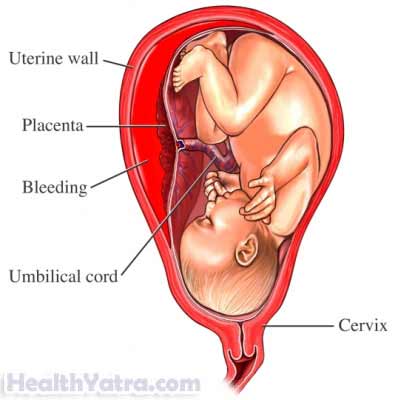Definition
Placental abruption occurs when the placenta separates from the uterus before the fetus is delivered. The placenta is the organ that provides nourishment for the fetus while it is still in the uterus. In a healthy pregnancy, the placenta remains attached to the uterine wall until after the fetus is delivered.
Some form of the condition affects about one in every 150 births. In very severe forms, placental abruption can cause death to the fetus. This occurs in approximately one in every 500-750 deliveries. Death of the mother from placental abruption is very rare. Infants who survive a birth with the condition have a 40%-50% chance of experiencing complications.
Placental abruption can cause:
- Premature delivery
- Fetal anemia
- Low birth weight
- Significant blood loss for the mother

Causes
The cause of placental abruption is often difficult to diagnose. Some common causes of the condition include:
- Injury to the abdomen from an accident or a fall
- Sudden decrease in the volume of the uterus, from significant loss of amniotic fluid or from the delivery of a first twin
- Abnormally short umbilical cord
- Acute development of high blood pressure (often associated with cocaine use)
Risk Factors
The following factors increase your chance of developing placental abruption:
- Previous placental abruption in a prior pregnancy
- High blood pressure during pregnancy
- Pregnancy during older age
- Multiple previous deliveries (greater than average number)
- Excessively distended uterus
- Diabetes
- Drug use (cocaine)
- Smoking during pregnancy
- Alcohol abuse during pregnancy
Symptoms
In the early stages, you may not have symptoms. When symptoms occur, they may include:
- Vaginal bleeding
- Abdominal pain
- Back pain
- Rapid contractions
- Soreness in the uterus
Diagnosis
Your doctor will ask about your symptoms and medical history. A physical exam will be done. A pelvic exam will also be done to examine your reproductive organs.
- Your doctor may need pictures of the fetus and placenta. This can be done with anultrasound.
- Your doctor may need to know how long it takes your blood to clot. This can be done with a blood coagulation profile.
Treatment
Talk with your doctor about the best treatment plan for you. Treatment options include:
Intravenous Treatments
Fluids may be given by IV to replace lost fluids. Blood transfusions may also be given to replace lost blood supply.
The mother and fetus will be carefully monitored for signs of distress or shock, including abnormal heart rates.
Emergency Cesarean Delivery
If danger exists for mother or fetus, an emergency Cesarean delivery may be done. If both the mother and fetus are at low risk of complications and the fetus is full-term, the mother may deliver vaginally.
Prevention
To help reduce your chance of getting placental abruption, take the following steps:
- Avoid taking drugs (especially cocaine), drinking alcohol, and smoking during pregnancy.
- Receive proper and regular prenatal care throughout the pregnancy.
- Promptly treat conditions, including diabetes and high blood pressure.
